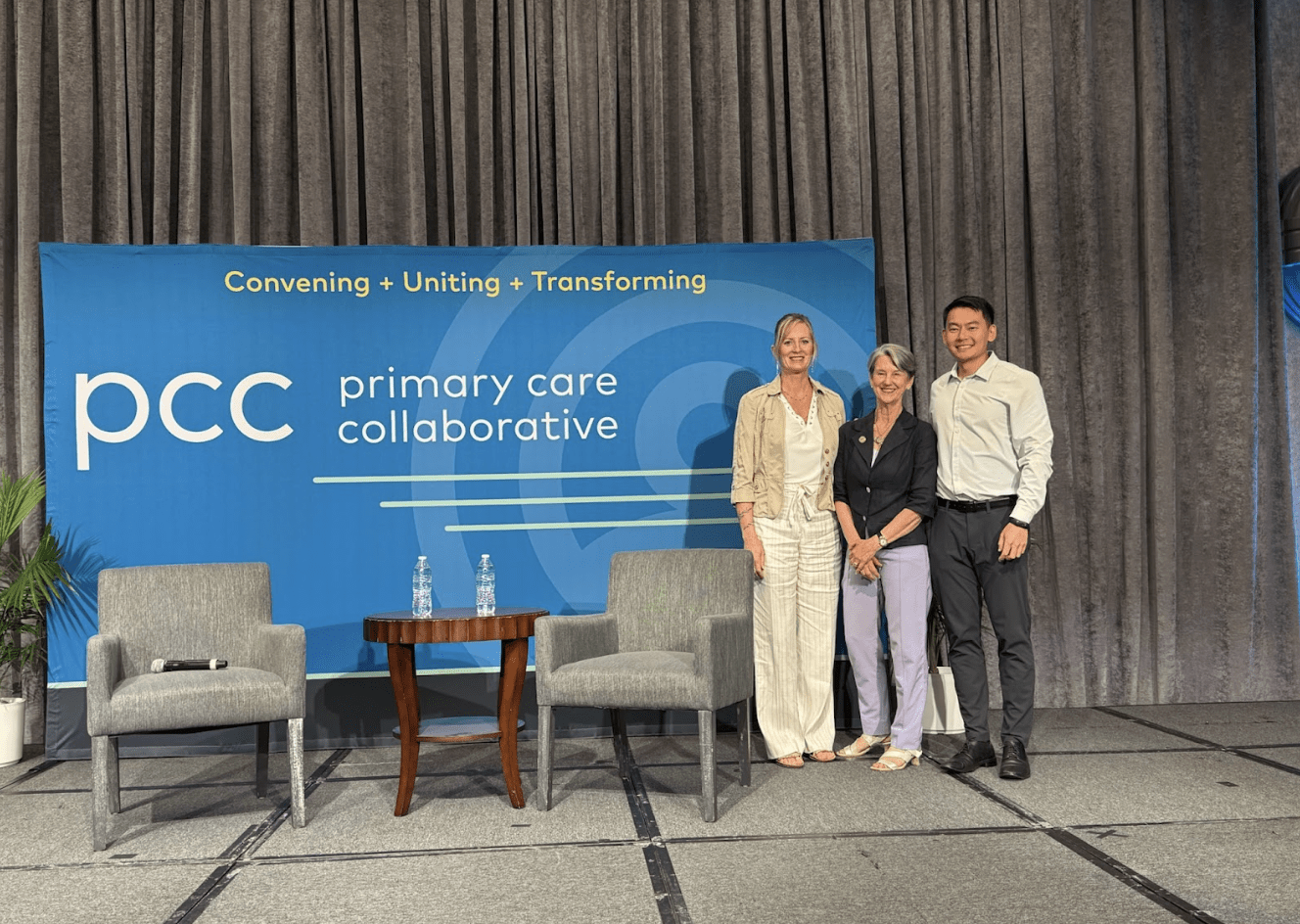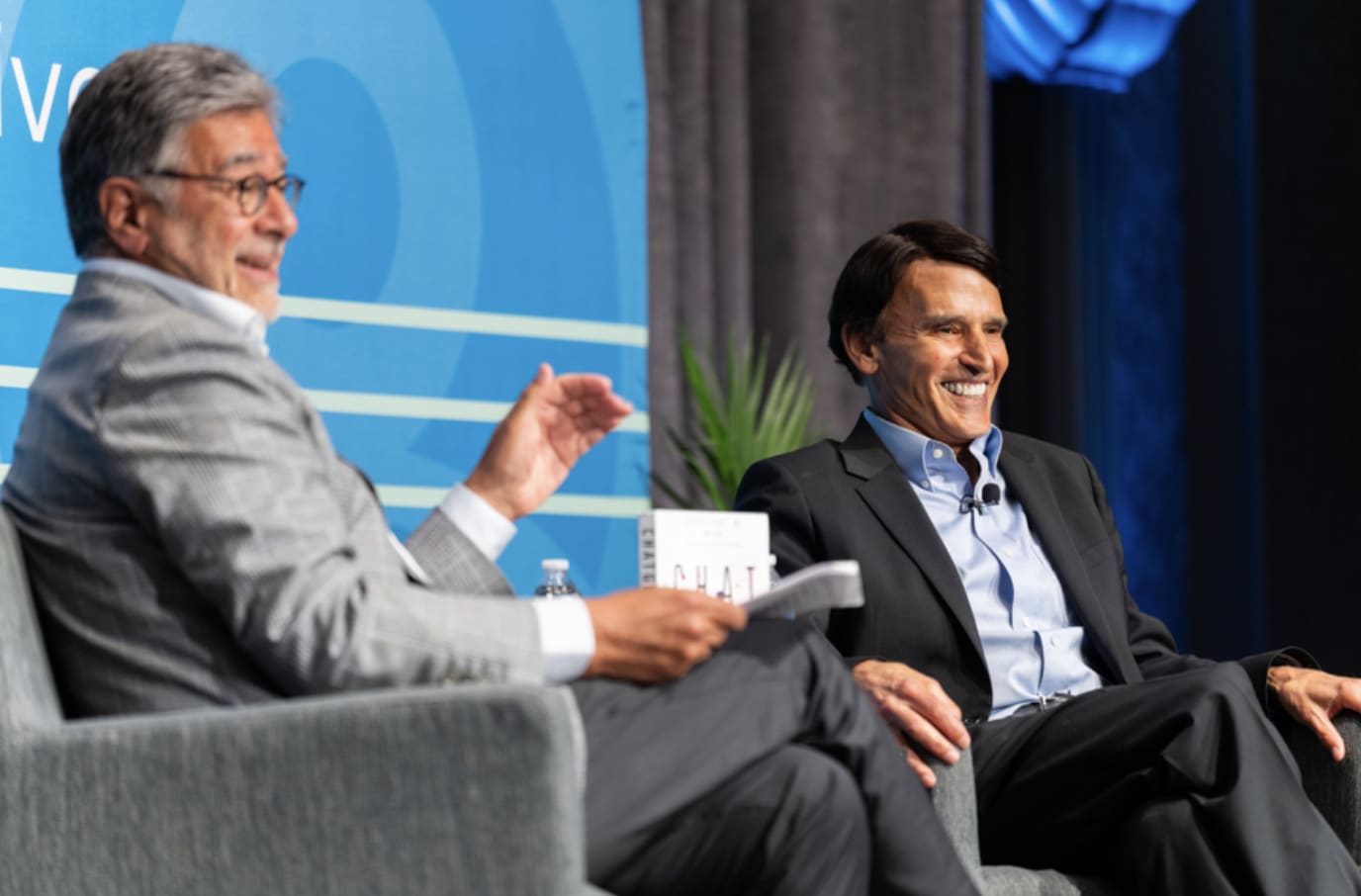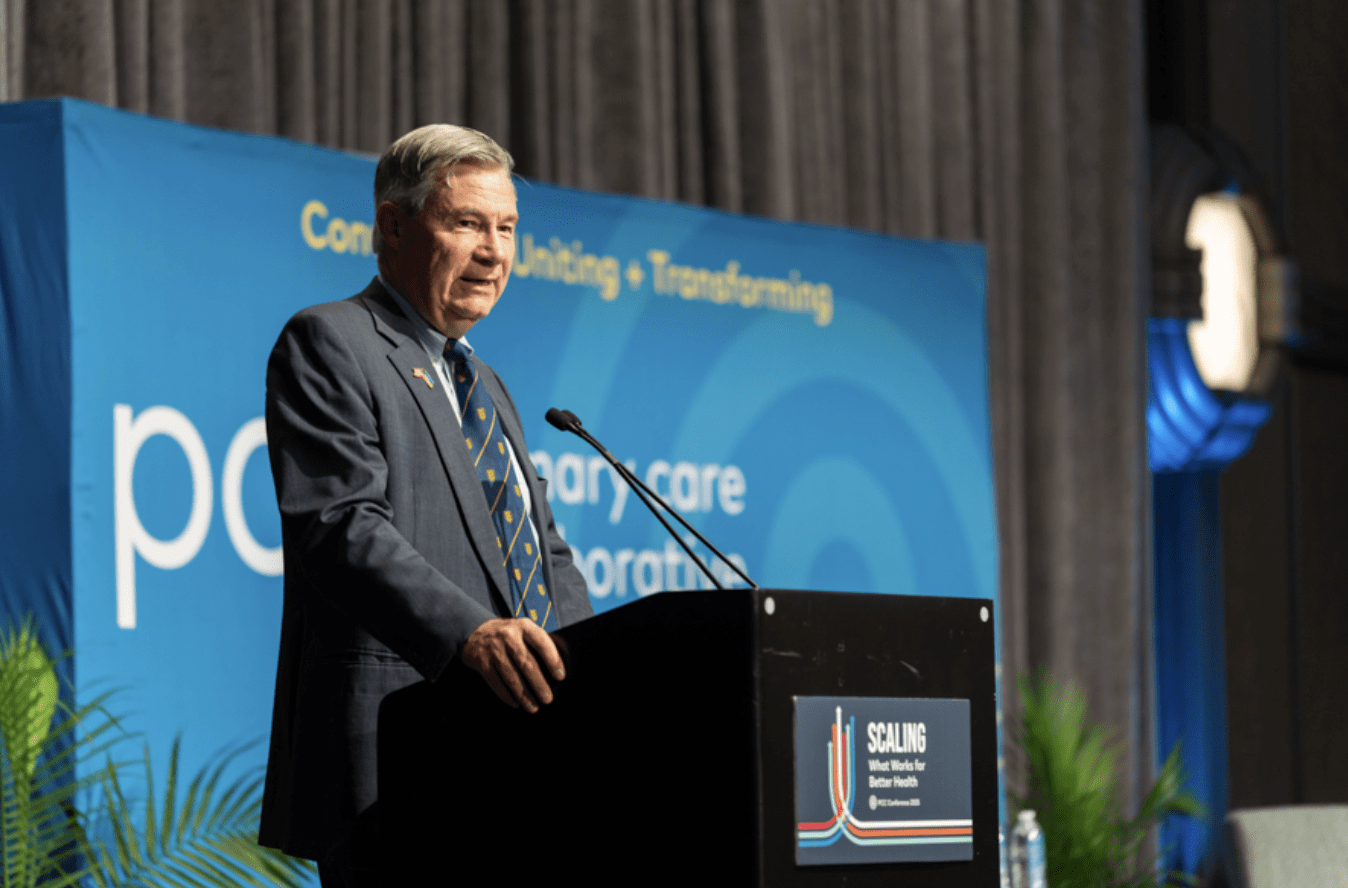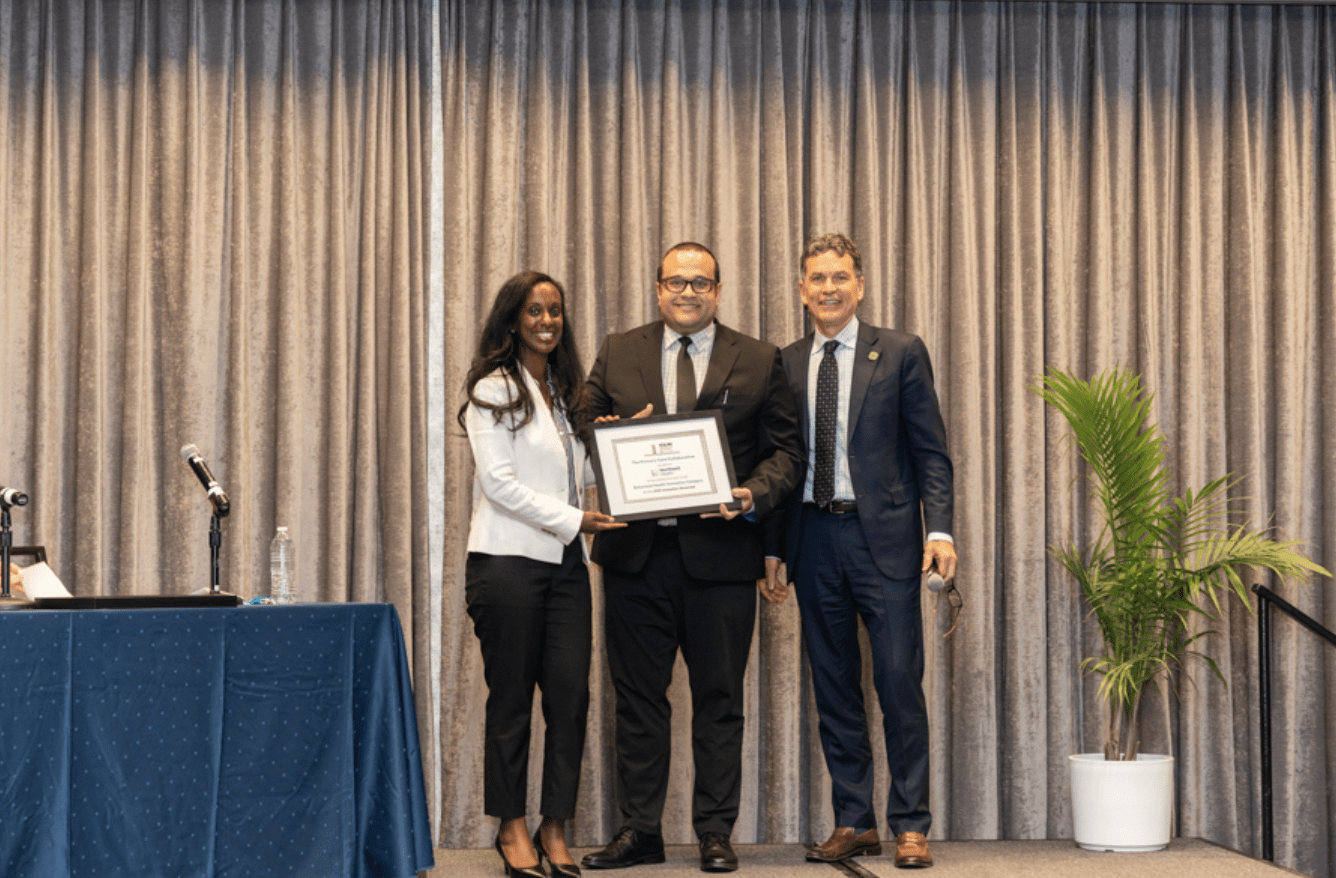Primary Care Collaborative’s Annual Summit 2025 – “Scaling What Works for Better Health”
As a family physician and proud member of the Primary Care Collaborative on behalf of Elation Health, I had the privilege of attending the Primary Care Collaborative’s June 2025 Annual Summit, “Primary Care: Scaling What Works for Better Health” along with my colleague Kristen Caldarella. Elation also brought along some guests: Dr Kenneth Qiu and Mr Brian Keyser. This year’s event was a powerful reminder of both the challenges and the immense potential facing independent primary care in America. We left feeling energized about Elation’s mission and the work ahead. The two-day event was action-packed, so we’ll share just a few highlights here.

Dr. Sara Pastoor, Ann Greiner (president/CEO, Primary Care Collaborative), Dr. Kenneth Qiu (Founder, EuDoc)
Capitol Hill: Policy in Action
The Summit was preceded by an invitation-only Capitol Hill briefing, where a small group of us heard directly from leaders at the National Alliance of Healthcare Purchaser Coalitions, VillageMD, and Blue Shield of California. Their message to congressional staffers was clear: if we want to rescue and revitalize primary care, we need payment reform—specifically, a hybrid model that combines upfront payments for population management with retrospective payments for preventive services. It was striking to hear that Blue Shield of California is the only commercial payer in the state with such a hybrid model.
A recurring theme was the outsized influence of Medicare. When CMS moves, the rest of the industry follows. Unfortunately, the absence of federal action has left us with a patchwork of state-level efforts, making it nearly impossible for large, multi-state employers to push for meaningful change in the commercial insurance industry. Regulatory barriers—like restrictions on using HSA funds for direct contracting—also stifle innovation. The Primary Care Enhancement Act could help, but it was cut from the latest budget bill.
The uncertainty around CMS-sponsored alternative payment models is also steering practices away from value-based care, which means fewer patients benefit. Employers, meanwhile, lack the market power to convince commercial payers to invest more in primary care, and when they do, the costs are often just shifted back to them in the form of higher premiums. Still, Blue Shield CA is doubling down on independent practices, recognizing that care is better and costs are lower outside of hospital systems.
Generative AI: Promise and Peril
One of the most anticipated sessions was on generative AI in primary care, featuring Dr. Clive Fields (VillageMD) and Dr. Robert Pearl (Stanford). The headline: adoption is happening fast—75% of clinicians surveyed are already using generative AI, and 90% find it valuable. AI is starting to support chronic disease management at scale, with wearables enabling real-time interventions, and patients increasingly using tools like ChatGPT to boost their health literacy.
At Elation, we’re already ahead in many areas, and the discussion left us feeling confident in our direction. The real challenge is ensuring AI augments care, rather than amplifying errors, breeding mistrust, or eroding the clinician-patient relationship.

Dr. Clive Fields (VillageMD), Dr. Robert Pearl (Stanford)
Medicare at the Crossroads
A panel with the Center for Medicare and Medicaid Innovation’s (CMMI’s) Chief Strategy Officer, Gary Bacher, underscored the centrality of primary care in future payment and technology models. CMMI is exploring hybrid payment models and ways to support independent practices with better infrastructure and data workflows. However, when pressed for specifics, there was little commitment—just encouragement to submit comments through the public request for information (RFI) process. It was a reminder that while the message is right, the details (and the action) are still uncertain.
Senator Whitehouse: A Voice for Primary Care
Senator Whitehouse’s remarks were a highlight. He shared Rhode Island’s success in doubling its primary care investment and warned of the dangers of proposed Medicaid cuts, which would devastate access for vulnerable populations. He encouraged all of us—especially those in heavily conservative states—to call our senators and advocate for protecting Medicaid. He’s also working on legislation to streamline prior authorization and support value-based, relationship-centered care.

Senator Sheldon Whitehouse, RI (D)
Innovation Showcase
Perhaps our favorite experience from the summit was the Innovation Showcase, in which representatives from four healthcare entities presented brief summaries of interventions they implemented that had meaningfully impacted the quality and cost of care for patients. The audience was asked to vote for the innovation that fell into each of three categories:
-
What is a healthcare innovation that's so wild it just might work?
-
What is a healthcare innovation that, if scaled, could change the world?
-
What is a healthcare innovation you'd invest $1M in?
All four innovations were impactful and impressive and all four deserve proliferation, but one project stood out to me: Ramsey Abdallah of Northwell Health in New York, against many odds, protests, and headwinds, convinced every specialty in their ambulatory network to screen patients for depression. They didn't want to do it, saying "that's primary care's job". But he never gave up. Calmly and tenaciously (and with the support of his leadership), he just kept pushing.
What they soon discovered was that they did not have nearly the behavioral health resources needed to diagnose and treat the many patients actively symptomatic with undiagnosed depression symptoms. So they had to hire more.
Mental health care is health care. Mental health conditions affect pain, wellbeing, immunity, function, disease self-management, capacity...literally every aspect of the human condition. And Northwell has said "this is not just primary care's job or behavioral health's job, we all own this, together.”
That’s the kind of innovation that’s so wild, it just might work. It could change the world.

Sarah Coombs (National Partnership for Women & Families), Ramsey Abdallah (Northwell Health), Sean Hogan (Innovacer)
Innovations in Senior-Focused Primary Care
The final panel showcased innovations in care for seniors. Duet: Partners in Health & Aging is empowering nurse practitioners to lead practices in underserved areas, Oak Street Health is leveraging team-based care for dual-eligible patients, and Blue Zones Health is making lifestyle medicine the foundation of primary care. CenterWell (Humana) is building deep, relationship-based care at scale, with a rigorous onboarding process for clinicians.
Technology is enabling much of this transformation. We were proud to hear Elation Health called out as an EHR that enables tracking of patient behaviors over time—Dr. Wayne Dysingereven said it was “more user-friendly than Epic,” which made our day. Other tools like AI-powered scribes and Salesforce CloudCoach are also helping practices streamline workflows and engage patients and caregivers.
Medicare Advantage is playing a key role in financing these innovations, allowing for front-loaded investments in team-based care that pay off in better outcomes over time. There’s a vision emerging of primary care that’s more flexible, team-based, and tech-enabled, with clinical decision support and eConsults helping manage specialty care access.
Final Reflections
Attending the Summit reinforced our belief that independent primary care is not just worth saving—it’s essential to the future of American healthcare. The path forward is complex, with policy, payment, technology, and trust all playing critical roles. But we left feeling hopeful. At Elation Health, we’re not just keeping up with the change—we’re helping to lead the way.
If you’re passionate about rescuing independent primary care, now is the time to get involved, share your voice, and push for the changes we know are possible.
